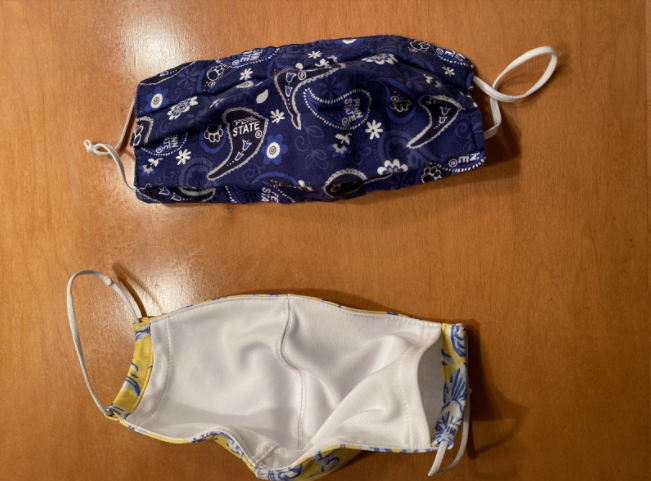How Masks Help Prevent the Spread of an Airborne Illness
March 18, 2021
As the COVID-19 virus began to spread around the world, health organizations and officials have continued to stress the importance of mask-wearing. Mrs.Kowalski, a biology teacher, reviews how masks work to prevent the spread of a virus and protect the wearer from infection.
Q: Can you explain how masks prevent the spread of an airborne illness, specifically COVID-19?
A: A mask helps prevent the spread of disease by keeping an infected person’s respiratory droplets and particles from being released into the air and infecting others. It can also be somewhat effective in protecting the wearer from breathing in infected respiratory droplets and particles.
Q: What is the best material for a mask to prevent the spread of a virus?
A: For those of us who are not medical professionals working in a medical setting–a mask made of two or more layers of washable, breathable fabric (such as tightly woven cotton fabric) works well. Some masks also have a filter insert that is used in addition to the two layers of cotton fabric. The mask should fit well-snugly over the nose and mouth and along the sides of the face. Nose wires are also beneficial for decreasing fogging of glasses/goggles, and can help to seal the mask at the top along the bridge of the nose.
JW: The CDC actually recommends that the use of N95 respirators should be reserved for health care workers, so Mrs Kowalski recommends cotton-fabric masks with changeable filters.
Q: Does wearing a mask protect the wearer or the people around them more?
A: A mask is shown to protect the wearer and those around them. That being said, a mask is more effective at protecting others as it helps contain infected respiratory droplets and particles, however it is also somewhat effective in preventing infected particles and respiratory droplets from entering the nose and mouth of the mask-wearer (as long as the mask is worn properly).
JW: The Washington Post published a story with a quote from the chief medical officer for the CDC coronavirus response. Brooks claimed: “Wearing a mask blocks you from inhaling potential virus-containing particles in the air… but most of the benefit to a mask is to block particles coming out of people who don’t know they are infected from exposing others.”
Q: When do you think it will be safe to live mask-freely?
A: Unfortunately, I do not know. It really depends on the development of Covid variants, vaccination dissemination, and when we reach herd immunity.
CDC. “COVID-19: Considerations for Wearing Masks.” Centers for Disease Control and Prevention, Centers for Disease Control and Prevention, 2021, www.cdc.gov/coronavirus/2019-ncov/prevent-getting-sick/cloth-face-cover-guidance.html.
Guarino, Ben, et al. Wearing a Mask Isn’t Just about Protecting Other People, the CDC Says. It Can Help You — and Might Prevent Lockdowns., 2020, www.washingtonpost.com/health/2020/11/12/covid-masks-protect-wearers/.



